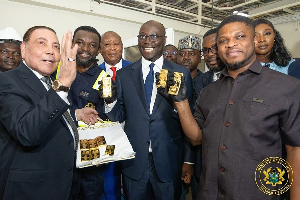Franklin Cudjoe, Kofi Bentil & Bright Simons
If ever there was a classic demonstration of how subsidies fail to achieve their intended effect, i.e. cushion the poor and vulnerable in society, the perennial premix confusion is it.
For a number of years now, this country has had to endure one controversy after the other about the distribution of marine fuel to fishermen for the powering of the canoes and other vessels so critical to their livelihoods.
Sometimes the scandal implicates a bunch of local bigwigs diverting the precious fluid for mixing with less-subsidised fuels in order to make a killing at the expense of the state and the hapless fisher folk of our coastal towns.
These bigwigs, sometimes members of grandly named “landing beach committees”, are, obviously, shameless beneficiaries of a state of “information arbitrage” that has resulted from discrepancies in the availability of information to different parties. The coastal fisherman has no idea how much fuel is actually available in his or her locality, and has no real prospect of access to accurate data in this regard.
The landing beach committee bigshot, on the other hand, has timely access to this information, and the means to profit from it, by mixing this information advantage with another kind of arbitrage: the artificial price difference between “premix” and other fuels.
The price difference is artificial simply because it is enforced by state subsidies.
It doesn’t take long, however, for everybody along the coast to realise that you don’t really have to be a “landing beach committee” chairman to benefit from this “price arbitrage”, notwithstanding one’s less than privileged access to “privileged information”. You can also join the queue for premix, and once you’ve had your consignment, turn around and sell it to folks who are masters of the “mixing” game.
A black market begins to flourish.
Justifiably outraged by the growth of this immoral black market, the good men and women of our government decide to up the ante. They institute a new measure: henceforth premix fuel should be dyed blue.
Blue, as we all know, is the colour of despondency.
It doesn’t take long for it to become obvious that where diversion is driven by economic incentive aesthetics rarely intrude. So, firstly, where the diversion occurs to feed a fuel retailing outlet, buyers, who presumably are being asked to police this new colour-based rule, remain locked out of the information loop: they have no way of judging the colour of the fuel they buy when it is unloaded from the fuel pump into their fuel tanks; and at any rate, save where there are issues of performance, they have no incentive to check. Secondly, it appears that in the normal mixing of premix and other fuel variants, any residual blue streaks are unlikely to affect the mood of black market buyers who obtain the diverted premix stock at lower prices. In fact, they have a perverted incentive, to ignore the baleful tones of the new blue fuel.
The question that begs to be asked is: have we looked at the root of the matter?
Why are we subsidising premix in the first place?
At first glance, it appears straightforward. We want to support poor fishermen. Though it is not clear whether fishermen, as a class of citizens, are to a woman poor and destitute, there is a generally accepted proxy justification, which is that: fishing communities are poor. It may well be that in such communities, fishermen may be less poor than others, but what matters, in the kind of economics that breed subsidies, is that “poverty exists” and it is the role of the government to “do something about it”. In what forms, at what levels, and in which sections of society it exists, goes beyond what is necessary for the policymaker to know to do her job well.
What is important is the sentiment that “government cares”. At any rate, the burdens associated with getting accurate data about the structure and texture of poverty as a prerequisite for developing sound policy are themselves strong disincentives for asking too many questions. “My friend, people are hungry, go away with your statistics and too-know talk.” So, even the most finicky technocrat shuts up and joins the fray of sentimental economics. And why not, there is every incentive to do so. You even sound more morally upright by holding a view like that.
The point though, as is evident in this pre-mix matter, is that the subsidies are being creamed off by people who aren’t necessarily poorer than the kaya-yei girl at Makola. Money that could have gone to provide this girl with job skills are being siphoned off by a bunch of coastal tin gods and crooks because they have been privileged with a label: fishing community. This is a “vested interest” and “identity politics” approach to understanding the dynamics at play.
The poor aren’t always the ultimate recipients of government largesse commandeered from the Middle Classes in their name. The poor, as a group, are, in fact, too dispersed and disorganised to benefit from the largesse. It is the organised usurpers of the “poor” label and the organised harnessers of the “poverty sentiment” that actually benefit from this “take from the slightly well-off and give to the poor” philosophy.
Thus is how the kaya-yei girl who pays VAT finds that she is actually subsidising the third canoe of the “Chief Fisherman” of Axim, if ever there is such a personage. This is even when the subsidised premix stocks are not diverted but put to its intended use: distribution at sub-market prices to fisher folk.
Thus is also how we find that we have not been subsidising fishermen at
all but fish. Almost on our blind side, our money has, for several years now, been
employed in the form of subsidies as a tool for the government to influence our choice of protein, and the senior management time currently being spent on the administration of premix distribution is also in the service of that goal.
Someone, for many years now, has decided that we can’t pay the market price for fish.
She has made this decision not without the knowledge that some of us may prefer poultry, beef, or had rather not have meat at all. She has decided that she wouldn’t let the fishermen buy their premix fuel at the prevailing market price because they will pass it on to us in the form of higher prices for fish. Instead she will give our taxes to the fishermen as a bribe not to recover the economic costs of bringing fish from the sea to the land. And the poultry farmer? The cattle rancher in Gwollu? The mushroom grower in Asamankese?
Do they have votes?
Not “votes” as in “votes”, but “votes” as in “block voting” and “voter agitation”; do they have any?
Are they a “community”? We have never heard of the “mushrooming community”. Have you?
That’s the point. There is really no serious economic justification for subsidizing premix.
The practice is a political dance favoured by the vote-obsessed elites of our major political parties. It is also a self-reinforcing system of perverse incentives for all those lucky to be caught up in the situation’s management. The “National Premix Secretariat” - heard of them? They remind us of the Berlin Wall. By the time it was torn down by the raging freedom-seekers of East Germany, it had developed into a sprawling bureaucracy complete with its own bye-laws.
Such, our friends, is the method of the bureaucratic worldview of economics: the creation of self-reinforcing systems of adverse incentives, all-round.
Do it well and you will never be out of a job – or power either. * ***Franklin Cudjoe, Kofi Bentil & Bright Simons are affiliated with IMANI Center for Policy & Education and www.AfricanLibertyy.org.
Opinions of Thursday, 20 August 2009
Columnist: Franklin Cudjoe, Kofi Bentil & Bright Simons














